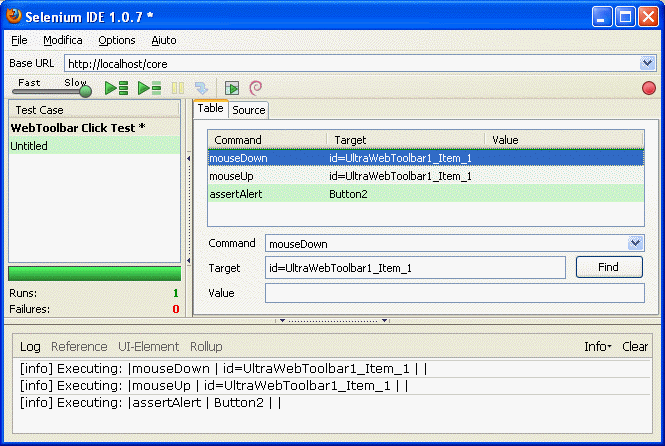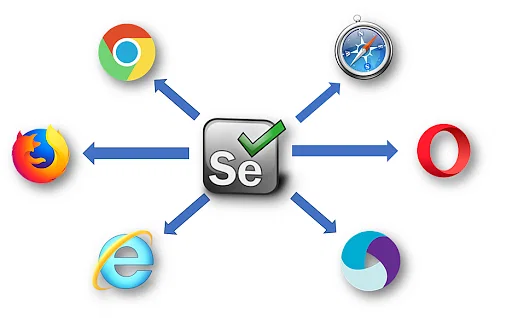Selenium- An Automation Tool

Web applications using Selenium Automation Testing With Java, an open-source, automated testing tool. Unfortunately, Selenium can only test online applications, so testing of desktop and mobile apps is not possible. Alternative tools including HP’s QTP and Appium are used to test software and mobile applications.

Unquestionably, Selenium is one of the most demanding and popular tools in the software testing industry, particularly for automated testing of web applications. Due to its powerful skills, adaptability, and sizable supportive community, it has experienced tremendous growth. Let’s examine some of the main factors that make Selenium the most difficult software testing tool:
Open Source and Multi-Browser Compatibility: Selenium is an open-source framework, which means it’s free to use and can be easily accessed by anyone. It provides excellent cross-browser compatibility, allowing testers to write scripts that work seamlessly across various web browsers such as Chrome, Firefox, Safari, Internet Explorer, and more.
- Language Support: Selenium supports a range of programming languages including Java, Python, C#, Ruby, and more. This flexibility enables software testers and developers to choose a language that aligns with their expertise and project requirements.
- Rich Set of Tools: Selenium is not just a single tool; it’s a suite of tools that cater to different testing needs:
- Selenium WebDriver: Provides a user-friendly API for interacting with web browsers and automating interactions.
- Selenium IDE: An integrated development environment for creating Selenium test cases through a record-and-playback mechanism.
- Selenium Grid: Enables parallel execution of tests across multiple browsers and machines.
- Flexibility and Customization: Selenium’s architecture allows testers to build customised test automation frameworks tailored to their project’s needs. It provides the flexibility to integrate with various tools, libraries, and plugins to enhance testing capabilities.
- Large Community and Support: Selenium boasts a vast community of users, developers, and testers who actively contribute to its growth. This results in an extensive pool of online resources, tutorials, forums, and Q&A platforms where users can seek help, share experiences, and learn from one another.
Why to use Selenium?
Selenium is primarily used for automating the testing of web applications. It provides a suite of tools and libraries that enable developers and testers to automate interactions with web browsers and perform various testing tasks. Here are the main use cases of Selenium:
- Functional Testing: Selenium is extensively used for functional testing of web applications. Testers can create automated test scripts that mimic user interactions such as clicking buttons, filling out forms, navigating through pages, and verifying expected outcomes.
- Regression Testing: Selenium is well-suited for regression testing, where previously tested functionalities are retested to ensure that new code changes or updates haven’t introduced new bugs or broken existing features.
- Cross-browser Testing: One of the significant advantages of Selenium is its ability to test web applications across different web browsers. Test scripts can be written once and executed on multiple browsers to ensure consistent behaviour across different platforms.
- Cross-platform Testing: Selenium also supports testing across different operating systems (Windows, macOS, Linux), allowing testers to ensure that the application functions correctly on various platforms.
It’s important to note that while Selenium is widely used for web application testing, it has its limitations, such as being primarily designed for web-based testing and having certain challenges related to handling dynamic content. Nevertheless, it remains a powerful tool for automating various testing aspects of web applications.
Advantages of Selenium Automation Testing With Java
There are several advantages to using Selenium as a tool for software testing:
- Cross-browser Compatibility Testing: Selenium supports multiple web browsers such as Chrome, Firefox, Safari, and Internet Explorer. This allows you to test your web application on various browsers to ensure cross-browser compatibility.
- Platform Independence: Selenium supports multiple operating systems (Windows, macOS, Linux) and programming languages (Java, Python, C#, etc.), making it a versatile tool that can be used across different environments.
- Open Source and Active Community: Selenium is open source, which means it’s free to use and has a large and active user community. This community continuously contributes to the tool’s development, updates, and provides a wealth of resources and support.
- Support for Multiple Testing Frameworks: Selenium can be integrated with various testing frameworks such as TestNG and JUnit, enabling you to write organised and structured test scripts, manage test suites, and generate reports.
- Integration with Continuous Integration (CI) Tools: Selenium can be seamlessly integrated with CI tools like Jenkins, Travis CI, and CircleCI. This enables automated testing as part of the continuous integration and delivery process.
- Flexibility and Customization: Selenium provides a high degree of flexibility in terms of customising and enhancing your test scripts. You can interact with web elements, simulate user interactions, handle dynamic content, and perform verifications.
- Real User Scenarios: Selenium allows you to simulate real user scenarios by interacting with elements on the web page, clicking buttons, filling forms, and validating results. This helps in identifying user experience issues.



Leave a Reply